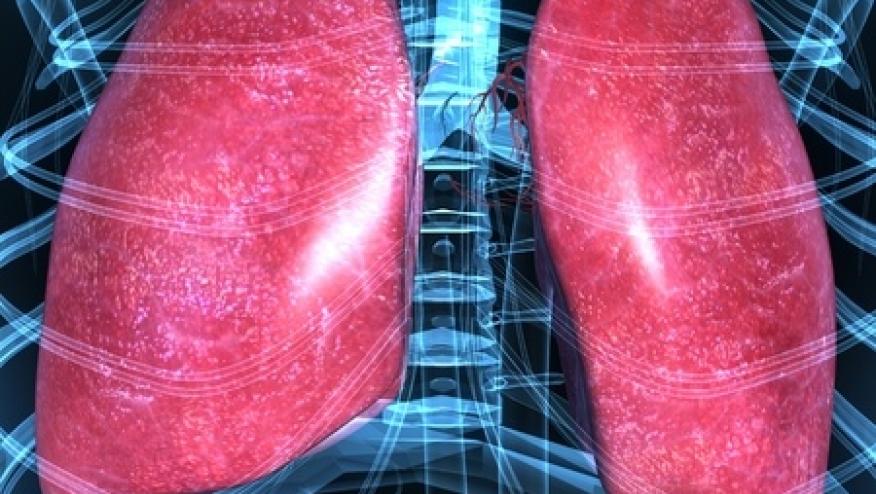Rheumatoid Arthritis Antibodies Linked With COPD Save

Women who were seropositive for anti-citrullinated protein antibodies (ACPA) and ultimately went on to develop rheumatoid arthritis (RA) were also at increased risk for being diagnosed with chronic obstructive pulmonary disease (COPD), analysis of data from the Nurses' Health Study showed.
In a multivariable analysis that adjusted for smoking and other potential confounders, pre-RA ACPA positivity was associated with a threefold increased likelihood of developing COPD (HR 3.04, 95% CI 1.33-7) compared with matched controls, according to Jeffrey A. Sparks, MD, of Brigham and Women's Hospital and Harvard Medical School in Boston, and colleagues.
And the risk of incident COPD was most pronounced in the years before, rather than after, RA diagnosis, with a hazard ratio of 10.84 (95% CI 1.13-104.08), the researchers reported online in Arthritis Care & Research.
One of the early events leading to the development of RA is citrullination of proteins at the mucosal surface of the airways, which can be followed by the production of ACPA in the setting of inflammation. The presence of these antibodies and pulmonary inflammation -- particularly among individuals with the HLA-DRB1 shared epitope -- can set the stage for structural changes and pulmonary disease even before the articular phase of RA becomes apparent.
Several studies have suggested a possible link between RA and COPD or asthma, but these were mostly retrospective or cross-sectional and lacked information on the participants' ACPA status.
To further address this question, Sparks and colleagues reviewed the records of women in the Nurses' Health Studies I and II who had donated blood prior to being diagnosed with RA. Participants included 1,125 individuals who developed RA after the initial blood draw for the analysis of COPD risk and 951 for the analysis of asthma risk.
In the COPD analysis, among the pre-RA cases who were ACPA positive (59 cases) and their matched controls (176), mean age at the time of the initial blood draw was 51 and the mean time between the blood draw and RA diagnosis was 6.4 years. For the pre-RA cases who were ACPA negative (224 cases) and their matched controls (666), mean age was 52 and the mean time between the blood draw and RA diagnosis was 10.6 years.
During 21,489 person-years of follow-up, there were 107 incident cases of COPD, 46.2% of which were diagnosed before RA developed. The mean age at the time COPD was diagnosed was 64.5, and three-quarters were smokers.
Unlike in the ACPA-positive pre-RA group, there was no association with COPD for the ACPA-negative pre-RA group (HR 1.07, 95% CI 0.65-1.75). However, when the analysis focused only on the years before RA diagnosis, there also was an increased risk for the ACPA-negative group (HR 1.94, 95% CI 1.06-3.54), although this was not as high as for the ACPA-positive group.
For the asthma analysis, the researchers identified 105 incident cases during 18,365 person-years of follow-up. Mean age at the time asthma was diagnosed was 59.4 years.
Compared with controls, women who subsequently developed RA had an increased risk for asthma (HR 1.65, 95% CI 1.11-2.46). The risk also was increased for those who were ACPA negative (HR 1.62, 95% CI 1.04-2.55), but not for those who were ACPA positive (HR 1.74, 95% CI 0.72-4.24).
Further research will be needed to clarify the relationship between RA and asthma, particularly because only women who were ACPA negative showed an increased risk, the researchers said. "Regardless of the biologic mechanism, our findings add to the growing literature of a bidirectional link between asthma and RA where each disease increases risk of the other."
"We found a strong association between elevated ACPA in blood banked prior to RA onset and COPD, even after adjusting for smoking, and this was most pronounced in the period before RA diagnosis," Sparks and co-authors continued. "These results suggest that biologic processes related to ACPA formation in airways could predispose patients to COPD development beyond the effect of smoking."
The investigators added that the results underscore the importance of careful monitoring of individuals who are ACPA positive -- not only for early signs of RA but also for pulmonary abnormalities.
A limitation of the analysis, the team said, was that the study sample consisted of nurses, who were mostly healthy and employed and therefore might not be entirely representative of the larger population -- they had also donated blood, further suggesting that they were a particularly healthy group.
The study was supported by the National Institutes of Health, the Rheumatology Research Foundation K Supplement, and the Brigham Research Institute.
One co-author is currently employed by GlaxoSmithKline.










If you are a health practitioner, you may Login/Register to comment.
Due to the nature of these comment forums, only health practitioners are allowed to comment at this time.